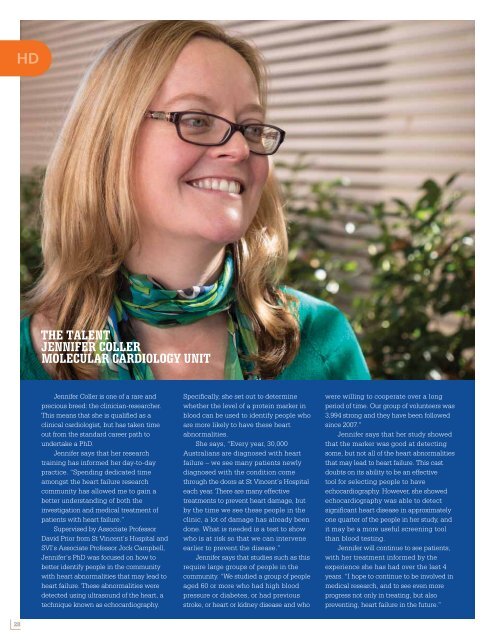1Kr4UxU
1Kr4UxU
1Kr4UxU
You also want an ePaper? Increase the reach of your titles
YUMPU automatically turns print PDFs into web optimized ePapers that Google loves.
HD<br />
THE TALENT<br />
JENNIFER COLLER<br />
MOLECULAR CARDIOLOGY UNIT<br />
Jennifer Coller is one of a rare and<br />
precious breed: the clinician-researcher.<br />
This means that she is qualified as a<br />
clinical cardiologist, but has taken time<br />
out from the standard career path to<br />
undertake a PhD.<br />
Jennifer says that her research<br />
training has informed her day-to-day<br />
practice. “Spending dedicated time<br />
amongst the heart failure research<br />
community has allowed me to gain a<br />
better understanding of both the<br />
investigation and medical treatment of<br />
patients with heart failure.”<br />
Supervised by Associate Professor<br />
David Prior from St Vincent’s Hospital and<br />
SVI’s Associate Professor Jock Campbell,<br />
Jennifer’s PhD was focused on how to<br />
better identify people in the community<br />
with heart abnormalities that may lead to<br />
heart failure. These abnormalities were<br />
detected using ultrasound of the heart, a<br />
technique known as echocardiography.<br />
Specifically, she set out to determine<br />
whether the level of a protein marker in<br />
blood can be used to identify people who<br />
are more likely to have these heart<br />
abnormalities.<br />
She says, “Every year, 30,000<br />
Australians are diagnosed with heart<br />
failure – we see many patients newly<br />
diagnosed with the condition come<br />
through the doors at St Vincent’s Hospital<br />
each year. There are many effective<br />
treatments to prevent heart damage, but<br />
by the time we see these people in the<br />
clinic, a lot of damage has already been<br />
done. What is needed is a test to show<br />
who is at risk so that we can intervene<br />
earlier to prevent the disease.”<br />
Jennifer says that studies such as this<br />
require large groups of people in the<br />
community. “We studied a group of people<br />
aged 60 or more who had high blood<br />
pressure or diabetes, or had previous<br />
stroke, or heart or kidney disease and who<br />
were willing to cooperate over a long<br />
period of time. Our group of volunteers was<br />
3,994 strong and they have been followed<br />
since 2007.”<br />
Jennifer says that her study showed<br />
that the marker was good at detecting<br />
some, but not all of the heart abnormalities<br />
that may lead to heart failure. This cast<br />
doubts on its ability to be an effective<br />
tool for selecting people to have<br />
echocardiography. However, she showed<br />
echocardiography was able to detect<br />
significant heart disease in approximately<br />
one quarter of the people in her study, and<br />
it may be a more useful screening tool<br />
than blood testing.<br />
Jennifer will continue to see patients,<br />
with her treatment informed by the<br />
experience she has had over the last 4<br />
years. “I hope to continue to be involved in<br />
medical research, and to see even more<br />
progress not only in treating, but also<br />
preventing, heart failure in the future.”<br />
28


